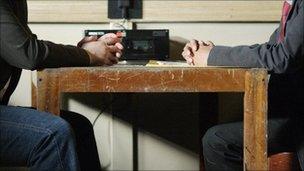Rape allegations among cases affected by Cadder ruling
- Published

Scottish police can no longer question suspects without allowing them access to a lawyer
Five rape allegations are among cases abandoned by prosecutors in light of the Cadder ruling.
In October, judges upheld an appeal by teenager Peter Cadder, whose assault conviction was based on evidence gained before he spoke to his lawyer.
In light of that ruling, 867 cases were abandoned, including 60 serious cases, nine of which were High Court cases.
The Scottish government said it had asked for a review of the relevant aspects of criminal law.
A spokeswoman added that the government welcomed "precautionary measures" taken by the Crown to reduce the impact of the ruling on pending cases.
But Scottish Labour called on Justice Secretary Kenny MacAskill to make an emergency statement.
Last year's ruling - that the Peter Cadder case breached the European Convention on Human Rights (ECHR) - meant Scottish police could no longer question suspects without allowing them access to a lawyer.
Until then suspects could be questioned for six hours without a lawyer present.
Following the decision, the Scottish government introduced emergency legislation to bring the country's rules into line with European human rights laws.
'Reduced impact'
At the time, the Crown Office said a total of 120 solemn cases would be affected by the judgement - double the actual number.
It had also estimated the number of possible appeals at close to 3,500. The actual number of 867 was said to be the equivalent to 0.3% of all criminal cases reported to the COPFS in a year.
The Crown Office claimed that precautionary measures it had taken had "significantly reduced" the impact of the judgment on prosecution.
Scott Pattison, director of operations at the Crown Office, said there had been "extensive liaison" between procurators fiscal and the police to minimise the number of cases affected by the ruling.
"Each case was then carefully considered by Crown Counsel before any conclusion was reached that no further evidence was available, and the case required to be discontinued as a result of Cadder," he said.
"In some solemn cases, we have decided to discontinue proceedings meantime - these cases are not closed and will be kept under review, so proceedings may be raised should additional evidence come to light in the future."
Labour's justice spokesman Richard Baker said the public had the right to know the full extent of "this disaster", and called on the justice secretary to brief MSPs.
He said the SNP government had acted too late by failing to act on "the much earlier Salduz case".
"Almost 900 accused persons will no longer face justice," he said.
"Some of those include High Court trials where Scotland's most serious crime is prosecuted including murder and rape."
'Devastating effect'
John Lamont, the Scottish Conservatives justice spokesman said: "We are now seeing the devastating effect this ruling is having on the Scottish justice system.
"Our conviction rate is suffering as self-confessed criminals are being allowed to walk free, and it will continue get worse as closed cases are referred back to the High Court for reconsideration."
Liberal Democrat justice spokesman Robert Brown said: "The loss of the ability to prosecute in 60 serious cases is extremely worrying but it demonstrates how out of line Scots law had become with the standards of justice demanded in the rest of the UK and across Europe.
"Crown Office must be particularly vigilant in reinvestigating these serious cases and continuing with every possible prosecution whenever this can properly be done."
'Robust system'
A Scottish government spokeswoman said: "A working group, led by the government, prepared for many months for the possible outcomes of the Cadder case, acting swiftly to bring in emergency legislation - with wide cross-party support - to ensure that the criminal justice system remains robust as well as fair and balanced respecting the rights of victims as well as accused persons.
"Since that legislation was passed, the group has monitored closely the impact of the case, and justice partners such as Acpos and the Crown Office have worked extremely hard to ensure their guidance and procedures now take account of the changes.
"In addition, the justice secretary has asked Lord Carloway to carry out a review of the relevant aspects of the criminal law, so that we can continue to have a robust justice system that is fair to all in the wake of this decision."
Of the nine abandoned High Court cases, five include rape allegations and one involved a firearms offence.
- Published8 February 2011
- Published27 October 2010
- Published26 October 2010
- Published26 October 2010
- Published12 June 2010